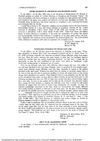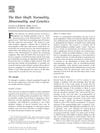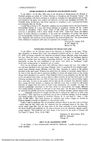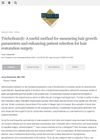 4 citations,
January 2022 in “The journal of investigative dermatology/Journal of investigative dermatology”
4 citations,
January 2022 in “The journal of investigative dermatology/Journal of investigative dermatology” A faulty KLHL24 gene leads to hair loss by damaging hair follicle stem cells.
The KRT84 gene is linked to better wool quality in Gansu Alpine Fine-wool sheep.
 May 2009 in “Hair transplant forum international”
May 2009 in “Hair transplant forum international” Androgens affect hair growth and shedding, with genetic and non-genetic factors influencing baldness.
179 citations,
June 2000 in “The American journal of pathology” The absence of functional sebaceous glands causes hair follicle destruction and scarring alopecia.
 73 citations,
April 2019 in “Experimental Dermatology”
73 citations,
April 2019 in “Experimental Dermatology” The scalp's microorganisms significantly affect hair health and disease.
65 citations,
February 2011 in “Molecular cancer therapeutics” CCT128930 is a promising new drug that effectively targets and inhibits a cancer-related protein, showing potential for cancer treatment.
48 citations,
November 2002 in “Journal of biological chemistry/The Journal of biological chemistry” Genetic variations in hair keratin proteins exist but don't significantly affect hair structure.
 5 citations,
January 2023 in “International Journal of Molecular Sciences”
5 citations,
January 2023 in “International Journal of Molecular Sciences” Hair follicles could be used to noninvasively monitor our body's internal clock and help identify risks for related diseases.
 1 citations,
April 2023 in “Biomolecules”
1 citations,
April 2023 in “Biomolecules” Fermented papaya and mangosteen in hair care products helped prevent hair loss and improve hair thickness.
 April 2024 in “Skin appendage disorders”
April 2024 in “Skin appendage disorders” Environmental pollutants can damage hair health and cause hair loss.
 December 2022 in “Journal of neurodevelopmental disorders”
December 2022 in “Journal of neurodevelopmental disorders” Hair follicle sampling is a practical method for measuring biomarkers in children with and without Fragile X syndrome.
 February 2016 in “Faculty Opinions – Post-Publication Peer Review of the Biomedical Literature”
February 2016 in “Faculty Opinions – Post-Publication Peer Review of the Biomedical Literature” A hair test can accurately predict if a person with hair loss will respond to minoxidil treatment.
 20 citations,
April 2014 in “Dermatologic Therapy”
20 citations,
April 2014 in “Dermatologic Therapy” Sulfotransferase in hair follicles helps predict how well minoxidil works for female hair loss.
 28 citations,
August 2003 in “Steroids”
28 citations,
August 2003 in “Steroids” Hirsute women have lower type 2 17β-HSD enzyme levels, which improve with treatment.
 September 1961 in “Archives of Dermatology”
September 1961 in “Archives of Dermatology” Colchicine causes hair loss by damaging hair follicles.
 37 citations,
January 2009 in “Dermatology”
37 citations,
January 2009 in “Dermatology” Healthy women tend to lose more hair in July and April, and the least in February.
 11 citations,
March 2001 in “Clinics in Dermatology”
11 citations,
March 2001 in “Clinics in Dermatology” Hair microscopy is useful for diagnosing hair disorders, but clear definitions are needed for accurate genetic analysis.
 1 citations,
October 1971 in “The BMJ”
1 citations,
October 1971 in “The BMJ” The document suggests that hair loss after stopping birth control may be similar to post-pregnancy hair loss and could recur with future pregnancies.
 33 citations,
September 1961 in “Archives of Dermatology”
33 citations,
September 1961 in “Archives of Dermatology” Colchicine causes rapid hair loss by damaging hair follicles.
 September 2022 in “Research Square (Research Square)”
September 2022 in “Research Square (Research Square)” Hydrocolloid wound dressings emit energy that can affect human hair follicle metabolism.
 May 2017 in “InTech eBooks”
May 2017 in “InTech eBooks” Trichoscopy and trichogram are useful for diagnosing hair and scalp conditions.
 October 1971 in “The BMJ”
October 1971 in “The BMJ” Hair loss can be linked to hormonal changes, and physical conditions like heart defects can cause depression.
 33 citations,
January 2017 in “Conservation physiology”
33 citations,
January 2017 in “Conservation physiology” Measuring reproductive hormones in brown bear hair could help identify their sex and reproductive state, but better collection methods or lab techniques are needed.
 1 citations,
March 2009 in “Hair transplant forum international”
1 citations,
March 2009 in “Hair transplant forum international” The TrichoScan method effectively measures hair growth and helps choose patients for hair restoration surgery.
 12 citations,
July 1993 in “The journal of investigative dermatology/Journal of investigative dermatology”
12 citations,
July 1993 in “The journal of investigative dermatology/Journal of investigative dermatology” Certain sex hormones and antiandrogens can either slow down or speed up the growth of human hair follicle cells depending on their concentration.
 126 citations,
January 1987 in “Journal of The American Academy of Dermatology”
126 citations,
January 1987 in “Journal of The American Academy of Dermatology” The document concludes that understanding hair structure is key to diagnosing hair abnormalities and recommends gentle hair care for management.
 94 citations,
January 2000 in “The Journal of Clinical Endocrinology and Metabolism”
94 citations,
January 2000 in “The Journal of Clinical Endocrinology and Metabolism” Spironolactone most effective for hirsutism, but has side effects.
 23 citations,
October 1971 in “BMJ”
23 citations,
October 1971 in “BMJ” Stopping the pill and giving birth both caused hair loss.
 21 citations,
January 2017 in “Skin Pharmacology and Physiology”
21 citations,
January 2017 in “Skin Pharmacology and Physiology” Caffeine-based liquid 0.2% is as effective as minoxidil 5% for treating male hair loss.
 8 citations,
April 2009 in “International journal of oncology”
8 citations,
April 2009 in “International journal of oncology” Hair follicle cells resist turning into skin cells.


























